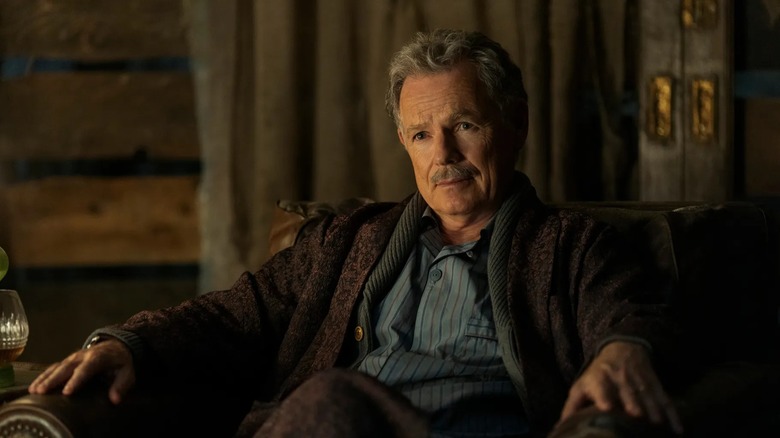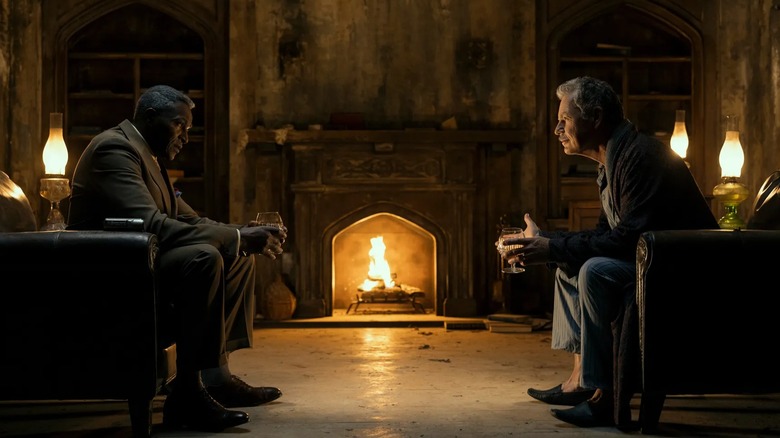The Best Monologue In Netflix's The Fall Of The House Of Usher Started Off As A Joke [ATX Festival]
When life gives you lemons, you make lemonade. Pretty straightforward, right? Well, no, not if you're a character in Mike Flanagan's fictional world — or Flanaverse, if you will — and especially if you're Roderick Usher (Bruce Greenwood), the unprecedented tycoon of an unbelievably corrupt empire in "The Fall of the House of Usher." Monologues have always been Flanagan's specialty, as these complex, rather elaborate verbal pieces allow us to glimpse the hidden heart of a character, including what drives them forward and how their worldviews tint their inner landscapes. In this particular instance, the recipient of Roderick's monologue is Auguste Dupin (Carl Lumbly), who soaks in every word, confounded by the intense and ironic nature of the unraveling.
The lemon monologue that graces the show's third episode is memorable for many reasons. It underlines Roderick's ruthless grasp on the minutiae of power and influence, where even humble, everyday produce like lemons can be leveraged to rake in millions. "First, you roll out a multi-media campaign to convince people lemons are incredibly scarce, which only works if you stockpile lemons, control the supply, then a media blitz," Roderick states, going on to underline how such a morally corrupt endeavor can be carried out with startling efficacy. Roderick's speech is meant to mire in excess, highlighting his greed, moral perversions, and cutthroat view of business, where every last drop of hope is squeezed in favor of limitless profits. Greenwood's sincere delivery of the lines heightens the irony, as the Ushers are at the forefront of the capitalist machine built on the backs of the exploited and the unfortunate.
During a recent panel at ATX TV Festival attended by /Film's Ryan Scott, the writer/director explained that the oft-quoted lemon monologue was "just a joke" that "kept happening" until Greenwood delivered it so memorably.
Flanagan turned a joke about lemons into an astounding monologue
During the panel, dubbed "The Monologue Case Study With Mike Flanagan," the storyteller expressed his admiration for monologues as an art form and noted how "increasingly rare" they have become in film and television. When asked about the creative process for the lemon monologue in "The Fall of the House of Usher," he explained how it started as a brief joke:
"The lemon monologue [...] it was meant to be a two-line joke. It was a joke! It's kind of like in 'Midnight Mass,' if you guys have seen that show. [...] There were monologues because I had a lot to say and this was a chance to say what I believe. With the lemon thing, which was a joke, it just kept happening. [...] I just became giddy about the idea of any actor performing it."
Greenwood, who had previously worked with Flanagan on "Gerald's Game," was used to shooting the monologue format without any cuts or edits, and replicated the process for "Usher." There, the humor of the scene hinged on the continuous focus on Roderick throughout his speech, which would then cut back to Dupin's bewildered face. Flanagan added:
"Nothing got cut. You can tell, because we never cut the camera [laughs]. Half the joke was that we stay on Bruce the whole time, and it's just a slow push, no edits, that the laugh would be when we cut back to Carl Lumley afterward. And it worked."
This Flanalogue, a term coined by actor Rahul Kohli (as recounted by Flanagan during the panel), ends on a rather grim note about the patent of cross-pollinated seeds to amass profits. It's a reference to a horrible real-life incident that makes Roderick's rant chillingly relevant within the context of rampant, remorseless late-stage capitalism.

